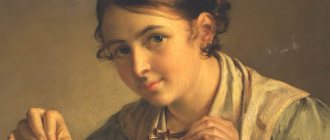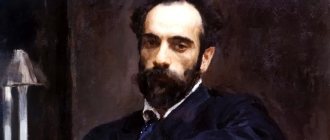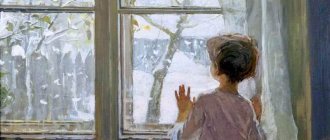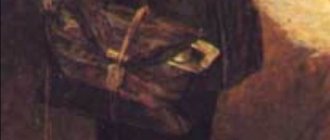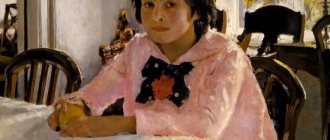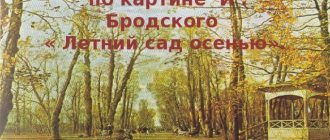In front of me is a canvas by the artist Feldman, the painting is dedicated to military themes, here is the story of one soldier who did not pass by the war. The painting is called "Motherland". The homeland occupies an important place in the soul of each of us. If we leave somewhere for a long time, we are drawn back to where we were born and lived most of our lives. Here is the long-awaited meeting with her.
I see a soldier who has just returned from the war, for many years he fought for its freedom and finally he returned home with a clear conscience. He does not know how his family and friends lived all these years and whether they are even alive. How is his village, does it still exist, or have enemies wiped it off the face of the earth?
What will happen when he returns? What will post-war life be like? All these thoughts are now in his head. He decided to stop near a birch tree that had long been familiar to him. Feel the familiar aroma. Look at the peaceful sky above your head, without enemy planes or bombings. He looks at it and doesn’t believe that it’s all finally over.
On his way he met a birch tree, a symbol of Russia, graceful, slender, graceful. The soldier is dressed in military uniform and has a duffel bag over his shoulders.
He looks into the distance with joy and sadness, he is glad that the war is over, but at what cost did he manage to do this! He remembered the dead comrades, the destroyed cities, the innocent inhabitants of these cities.
In the background you can see young birch trees, somewhere in the distance there are houses, meadows, and fields. The clear sky is attractive; there is not a single cloud on it; many cirrus clouds float across it. Yellowed grass lies on the ground, and bright wildflowers grow here and there.
When painting a picture, the master does not use bright colors; all shades used in painting are muted. There are many dark shades in the picture, including the soldier’s clothes and the village; the artist paints the sky and birch trees with light colors.
The picture makes you think about the fate of this soldier, remember the Great Patriotic War. I would like to hope that when the soldier returns home, all his relatives will be alive and will greet him with joy.
SECOND ESSAY OPTION:
Essay plan: 1. The theme of the Great Patriotic War in the works of V. Feldman.2. Interpretation of the title of the painting.3. Description of the plot of the picture: a) surrounding nature; b) image of a village; c) the main character is a soldier.
4. The feelings that the picture evokes.
The Great Patriotic War was a terrible page in the history of Russia. A huge number of human victims, destroyed cities and villages, broken destinies of people.
Soldiers and commanders, the entire people showed the greatest courage and heroism in this brutal battle. On May 9, 1945, the Soviet army defeated Nazi Germany, which brought peace to Europe.
The theme of war and victory has become very popular in the works of writers, poets, and artists who glorified the feat of the Soviet soldier.
The author of the painting “Motherland” V. Feldman fought at the front during the war. Therefore, this topic of creativity was very close to him. The title of the painting attracts attention. I think that the artist wanted to reflect several meanings of the word homeland at once. This is both the native country and the place where a person was born.
Before us is a plot that could often be seen after the end of the war. A soldier returns home, where he has not been for several years. He walked many miles, experienced a lot of grief, and now stands on the land that gave birth to him and raised him.
After the Victory, the fighter did not immediately return. The artist describes a picture of autumn nature. Underfoot there is yellow dried and withered grass, in the distance there are harvested fields, leaves have fallen from the trees. The color scheme corresponds to the time of year: yellow, brown, beige colors. And only the sky with white fluffy clouds stands out as a bright blue spot. And the trunks of the birch trees turn white.
He is already close to the house, his heart is pounding in his chest with excitement.
On a hillock a soldier stopped near a birch tree. It contains a piece of our native land! The image of a birch is not accidental. Russia is associated with this tree all over the world; it is most often remembered by those who are far from their native land. Probably, in the moments of calm between battles, the soldier dreamed of the moment when he could hug a birch tree.
From the hillock his village with old huts and rickety fences is clearly visible. The soldier peers into the distance with interest, trying to see everything that is dear to his heart. The fighter’s face glows with hope for a long-awaited meeting with loved ones. Eyes wide open, lips slightly stretched in a smile.
The portrait of the hero reflects a collective idea of the Russian soldier. Wide face, weathered skin, wheat-colored hair. The hands of a hard-working man hugging a birch tree. He is dressed in a battered overcoat, with a duffel bag over his shoulders.
To describe the soldier, the artist uses shades of yellow and green colors.
The whole picture is filled with anticipation and hope for the best. She leaves in her soul bright feelings, pride for her land and her people - the winner.
Source: https://po-kartine.ru/v-feldman-rodina-sochinenie-po-kartine.html
Essay on the painting “Motherland” by V. Feldman, grade 9 - Essays, abstracts, reports on all topics
Before us is a painting by V. A. Feldman “Motherland”. In the foreground is a soldier hugging the trunk of a birch tree. .The soldier looks dreamily into space. A village is visible in the distance. It is easy to assume that the soldier returned home from the war.
In the foreground of the picture, the composition is built in a vertical direction: the main place in it is occupied by the figure of a soldier, but images of birches also play an important role. In the background, on the contrary, the composition gravitates towards a horizontal direction: village houses, and in the distance - expanses of fields. It can be seen that the soldier is standing on a small hillock, and the village is located just below.
The soldier is a fair-haired guy in a long gray overcoat; A small bag hangs behind his back. Probably, the soldier has not been in his native village for a long time, but we see that he is in no hurry to go towards the houses. He admires the simple picture of his native nature, inhales the smells of his native land, perhaps remembers something connected with these places.
Maybe how he worked in the field with his father for the first time, or maybe how he went to the forest with friends, how he ran through the meadow after a pretty girl... The artist called his painting “Motherland”. But what is it? Earth? Sky? People? Home, family, garden outside the window, nearby forest? White trunks of birch trees or colorful patches of fields?.. There are no leaves on the trees, the ground is strewn with yellow leaves.
Somewhere in the distance you can see a green strip of meadows. The day is clear, but not sunny. The harvest from the fields has already been collected. The soldier returned home in the fall. Multi-colored stripes of vegetation converge at the horizon - yellow, green - and the gray expanse of fields.
It’s like there are numerous roads, they merge in the distance, and it often seems to people that somewhere out there, far, far away, it must be better than where they were born and raised. But the hero of Feldman’s film has already visited other places, so he looks at his native land with different eyes.
Essay based on the painting by V. P. Feldman “Motherland”
V. P. Feldman is a famous Russian artist. He devoted almost his entire creative career to depicting the Motherland, Russian nature, and native expanses. He also has a series of works dedicated to the Great Patriotic War. He himself belonged to the generation given over to war. When the war began, he had just reached adulthood. Having walked the front line to victory, he knew firsthand about the hardships of war and at what cost this victory was achieved. Vladimir Feldman was a brave soldier at the age of 18. And the artist died young, he was only 37 years old. Front-line wounds made themselves felt. Therefore, “Motherland” was lived and felt personally by the author.
What does Feldman's painting Rodin reflect?
The author gives this title to his work for a reason. It reflects the longing of soldiers and officers for their native land, where every birch tree is familiar. The title of the painting is multifaceted. Homeland in the understanding of the Fatherland, its greatness and beauty. The concept of a small homeland is also included here: native village, hamlet, village, city. In the foreground of the picture the master depicted a soldier. He is a young man, but you can see from his face that he has been through a lot. He is wearing a tattered soldier's overcoat, and behind his shoulders is a simple hiking backpack with simple things. The soldier leans his elbows on a white birch tree and looks thoughtfully into the distance.
There is pain, sadness and hope in his eyes. Pain and sadness from memories. And the hope is that his family and friends are still alive and are still waiting for him. At this moment he feels the joy and bitterness of victory at the same time. He looks at the clear sky, across which white and airy clouds float, and cannot believe that everything is already over. There will be no more bombing, shooting and trenches. The author specifically depicted his hero in a birch grove. The white-trunked beauty has always and everywhere been a symbol of our Motherland. The soldier tenderly hugs the birch tree, as if he was missing the girl very much. Nearby there is a stump - a cut down or dead tree. This also seems symbolic to me.
Not everyone survived this bloody war. The homeland suffered greatly from enemy fire. It took a long time for the warrior to reach his native land. Under the soldier’s feet, yellowed grass, autumn flowers and bright fallen leaves are depicted in large strokes. Most likely, he was wounded in the last battles for victory. The soldier spent a long time in the hospital. The wound was severe. That is why he was able to return home only in the fall. The black fields behind the hero’s back speak about this. The harvest has long been harvested. The master also depicted simple Russian huts. The walls and roofs of many are already lopsided. The men were not in the village for a long time, so there was no one to repair the houses. Probably, a family is waiting for our hero in one of these houses. The first long-awaited meeting has already taken place - the meeting of the hero of the picture with the Motherland. A little more and he will also be able to hug his wife and mother, as he is now hugging the white-trunked beauty.
Speech development lesson “Story based on V. Feldman’s painting “Motherland”, 9th grade
Speech development lesson
“The essay is a story based on a painting by V.P. Feldman "Motherland"
Teacher's opening speech: Hello, sit down. Now we have a Russian language lesson, a lesson in speech development. I would like to start by saying that our lesson today takes place on the eve of an important holiday - Victory Day. This is the main holiday of our Motherland, especially in this anniversary year, which marks the 70th anniversary of the Victory Day.
This is the day of the complete and final defeat of Hitler's army. The victory showed the courage and heroism of the entire people of our country. Poets, writers, and artists created immortal works, glorifying the exploits of our soldiers. Artists dedicated thousands of paintings to Victory Day alone.
And each artist saw it in his own way (slides with paintings).
— What do these paintings have in common? (Soldiers returning home from the war).
- Today in class we will prepare for a story based on Vladimir Feldman’s painting “Motherland” (write in a notebook: date, theme).
- — In the year of celebrating the 70th anniversary of the Victory, the word “homeland” takes on special meaning.
- Checking homework:
— Today you were given homework in which you had to write a mini-essay “What does the word “homeland” mean to me.” (Essays are read out).
— From your writings we can conclude that you, like every person, have a small homeland and a large homeland. This is your home, our village in which you were born, this is also our state, as well as our common planet Earth. Most importantly, the Motherland must be loved and protected.
Working with the word:
— Let’s look at the interpretation of the word “homeland” in S.I. Ozhegov’s Explanatory Dictionary.
Motherland , -s, w. 1. Fatherland, native country. Defense of the Motherland. 2. Place of birth, origin of someone, place of origin of something. Came home.
- - Select words with the same root for the word “homeland”, write them down in a notebook (genus, native, born, relatives, relatives, pedigree).
- - Choose synonyms for the word “homeland”, write them down in your notebook: fatherland, fatherland, country.
- Conversation on the painting:
— Now let’s turn to Vladimir Feldman’s painting “Motherland.” Open the picture in your textbook. Its author is a famous artist. He himself fought, went to war at the age of 18, and after the war he graduated from art school. It is clear that the plot depicted in the picture is very close to him. Vladimir Feldman died very early, at just over 30 years old, from wounds received in the war.
- Look carefully at the picture. What episode did the artist depict here?
— Who is depicted in the picture? (A soldier who returned home from the war. The plot of the picture is very simple. Such a picture could very often be seen immediately after the war.).
— Why does the author choose the word “homeland” from a whole range of synonyms for his picture? (a word that is closer and more understandable to every person).
-What is his homeland like? (Central Russia, ordinary village).
- What season? (Autumn. Yellow, withered grass underfoot, harvested fields in the distance, leaves have fallen from the trees).
Essay based on Feldman’s painting “Motherland”
The painting “Motherland” is one of the paintings by V.A. Feldman, with whom the author tried to convey to each of us the full significance and depth of this word.
The main place on the canvas is occupied by a soldier - a young blond guy in a long overcoat. He leans against the white trunk of a birch tree and looks into the distance in fascination. He was in a foreign land for a long time, yearned for his home and finally returned. The village is very close, houses are already visible, but the soldier is in no hurry to get to them.
He stopped on a hillock overgrown with yellowed grass, stroked the snow-white bark with his rough palm and froze, admiring the discreet beauty of his native place. The golden carpet under his feet is decorated with the last autumn flowers, but the soldier does not notice them. He deeply inhales the cool autumn air and cannot breathe. Memories of something close and dear are swirling around the guy’s head. A slight smile touched his lips. Perhaps he remembered how, as a boy, he rushed between these birches with friends, or how here, under this tree, he first met the girl he liked. After all, our memory carefully preserves all these little things that make life bright and unique.
Does your teacher check for plagiarism? Order a unique work from us for 250 rubles
Connect with us:
So what is “Motherland”? It is not only the country in which a person was born. This simple and familiar word contains so many dear, sweet little things. Homeland is a house familiar from childhood, a street along which I ran with friends, a river with cool and clean water, old trees in a large garden.
Sometimes people think that somewhere far away there are better places than where they were born. But if you happen to not see your native places for a long time, then you look at them differently. So this guy, after many years of separation, now cannot get enough of a seemingly ordinary picture. It was as if he saw these birches and the pale blue sky with white clouds for the first time.
There are practically no bright colors on the canvas. The soldier's overcoat is similar in color to the fields around the village. This creates a feeling of unity between man and nature.
The figure of a soldier occupies most of the canvas, but the author called his painting “Motherland.” So who then is the main character in this canvas - a soldier or nature? This is the peculiarity of painting, that each of us can, at our own discretion, interpret the plot depicted by the master’s brush. The hero’s thoughts, his feelings, the general impression of the picture - each of us feels all this in our own way. And for me, the title of the picture only emphasizes the depth of feelings experienced by the soldier at the sight of his native places.
I'm especially drawn to the soldier's gaze. It took him a long time to get home, most likely he was tired from the road, but his eyes glow with joy. With his head held high, the guy looks into the distance with the hope that everything will be fine in his life now. It seems that separation from family and friends made the soldier strong and purposeful. He can, he will achieve what he wants to achieve.
Although the picture depicts autumn, and besides, the day is not sunny, it still exudes some kind of warmth, a desire for something new. I would like to believe that this separation was the last.
Essay based on the painting by V. Feldman “Motherland”
The famous Russian artist Vladimir Petrovich Feldman was born in Moscow in 1924. He was a painter and landscape painter. His most ambitious work of art is the painting “Motherland,” painted in the fifties of the last century.
The painting is painted in oil on canvas in rather cold colors. The picture is dedicated to military themes. The homeland is sacred. It is necessary to protect it and defend it.
In the picture we see a poor soldier standing in the middle of a field, hugging a birch tree, looking into the distance, and thinking about the past war.
How painful it is to understand and realize that the war took many people to another world, destroyed families, the destinies of many people. And how pleasant and warm it is to hug your native birch tree, which grew before your eyes, which was a friend and remained to live.
The birch is a symbol of Russia, so slender, beautiful, graceful. And it seems that this is his best friend who is ready to listen to all his problems and troubles.
It’s so good to breathe fresh air and understand that you are free, they won’t come for you anymore and there is no threat to you or the people around you.
Behind the soldier’s back we see a backpack, apparently collected to escape from enemies. It is quite possible that it contains some water, a piece of bread and a wrinkled shirt. Behind us we see a small village that has survived the difficult days of war. The sky is blue and cloudy.
The clouds are floating, running away from the incidents that happened in the forties, running from fear, running from war.
The sun is not visible at all, apparently the clouds are saving it, covering it so that it is not touched and it remains to live and shine for all future generations.
In the soldier’s eyes we see both melancholy and joy. Melancholy from losses and anger, the desire to take revenge on the enemy for all loved ones, relatives, and friends. The joy that the war is over, the war is already behind us, but at what cost did it end?
V. Feldman – Motherland (essay based on the painting)
In front of me is a canvas by the artist Feldman, the painting is dedicated to military themes, here is the story of one soldier who did not pass by the war.
The painting is called "Motherland". The homeland occupies an important place in the soul of each of us. If we leave somewhere for a long time, we are drawn back to where we were born and lived most of our lives. Here is the long-awaited meeting with her.
I see a soldier who has just returned from the war, for many years he fought for its freedom and finally he returned home with a clear conscience. He does not know how his family and friends lived all these years and whether they are even alive. How is his village, does it still exist, or have enemies wiped it off the face of the earth?
What will happen when he returns? What will post-war life be like? All these thoughts are now in his head. He decided to stop near a birch tree that had long been familiar to him. Feel the familiar aroma. Look at the peaceful sky above your head, without enemy planes or bombings. He looks at it and doesn’t believe that it’s all finally over.
On his way he met a birch tree, a symbol of Russia, graceful, slender, graceful. The soldier is dressed in military uniform and has a duffel bag over his shoulders.
He looks into the distance with joy and sadness, he is glad that the war is over, but at what cost did he manage to do this! He remembered the dead comrades, the destroyed cities, the innocent inhabitants of these cities.
In the background you can see young birch trees, somewhere in the distance there are houses, meadows, and fields. The clear sky is attractive; there is not a single cloud on it; many cirrus clouds float across it. Yellowed grass lies on the ground, and bright wildflowers grow here and there.
When painting a picture, the master does not use bright colors; all shades used in painting are muted. There are many dark shades in the picture, including the soldier’s clothes and the village; the artist paints the sky and birch trees with light colors.
The picture makes you think about the fate of this soldier, remember the Great Patriotic War. I would like to hope that when the soldier returns home, all his relatives will be alive and will greet him with joy.
SECOND ESSAY OPTION:
Essay plan: 1. The theme of the Great Patriotic War in the works of V. Feldman.2. Interpretation of the title of the painting.3. Description of the plot of the picture: a) surrounding nature; b) image of a village; c) the main character is a soldier.
4. The feelings that the picture evokes.
The Great Patriotic War was a terrible page in the history of Russia. A huge number of human victims, destroyed cities and villages, broken destinies of people.
Soldiers and commanders, the entire people showed the greatest courage and heroism in this brutal battle. On May 9, 1945, the Soviet army defeated Nazi Germany, which brought peace to Europe.
The theme of war and victory has become very popular in the works of writers, poets, and artists who glorified the feat of the Soviet soldier.
The author of the painting “Motherland” V. Feldman fought at the front during the war. Therefore, this topic of creativity was very close to him. The title of the painting attracts attention. I think that the artist wanted to reflect several meanings of the word homeland at once. This is both the native country and the place where a person was born.
Before us is a plot that could often be seen after the end of the war. A soldier returns home, where he has not been for several years. He walked many miles, experienced a lot of grief, and now stands on the land that gave birth to him and raised him.
After the Victory, the fighter did not immediately return. The artist describes a picture of autumn nature. Underfoot there is yellow dried and withered grass, in the distance there are harvested fields, leaves have fallen from the trees. The color scheme corresponds to the time of year: yellow, brown, beige colors. And only the sky with white fluffy clouds stands out as a bright blue spot. And the trunks of the birch trees turn white.
He is already close to the house, his heart is pounding in his chest with excitement.
On a hillock a soldier stopped near a birch tree. It contains a piece of our native land! The image of a birch is not accidental. Russia is associated with this tree all over the world; it is most often remembered by those who are far from their native land. Probably, in the moments of calm between battles, the soldier dreamed of the moment when he could hug a birch tree.
From the hillock his village with old huts and rickety fences is clearly visible. The soldier peers into the distance with interest, trying to see everything that is dear to his heart. The fighter’s face glows with hope for a long-awaited meeting with loved ones. Eyes wide open, lips slightly stretched in a smile.
The portrait of the hero reflects a collective idea of the Russian soldier. Wide face, weathered skin, wheat-colored hair. The hands of a hard-working man hugging a birch tree. He is dressed in a battered overcoat, with a duffel bag over his shoulders. To describe the soldier, the artist uses shades of yellow and green colors.
The whole picture is filled with anticipation and hope for the best. She leaves in her soul bright feelings, pride for her land and her people - the winner.
Source: https://po-kartine.ru/v-feldman-rodina-sochinenie-po-kartine.html
Feldman homeland description of the painting is brief. Essay on painting B
V. Feldman is a famous artist who in his works very often touched on the theme of war, using the genre of military art.
And this is not without reason, because he, like many other creative people who saw military operations with their own eyes, heard moans and cries, could not ignore this topic. One of these works is the painting Motherland.
Today we got acquainted with this painting in class and now we have to paint Rodin Feldman’s paintings for the 9th grade.
The painting itself was painted by the artist after the war. This happened in the fifties. And although the war was already over, the memories were very fresh and for a long time will have their echoes in the works of artists and Feldman was no exception, as evidenced by his painting.
